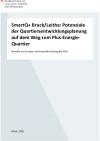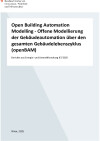Suchergebnisse
see-it - Camera based, user centric daylight control system for optimized working conditions
In the project technologies in the field of building construction and building automation are being researched for quality and performance improvements in the workplace. The aim is to individualize the control of sun protection to the people who need to be protected from glare and overheating and hope to see through.
BIM4BIPV - Future aspects of building-integrated photovoltaics (BIPV) in cross-system BIM planning
Research into an end-to-end BIM planning flow for energy-optimised, building-integrated photovoltaics (BIPV) that simultaneously generates solar energy, enables optimal use of daylight and provides shading.
BIMaterial Prozess-Design für einen BIM-basierten, materiellen Gebäudepass
Generierung des materiellen Gebäudepass (MGP) - Dokumentation der materiellen Zusammensetzung eines Bauwerkes, die quantitative und qualitative Auskunft über die relevanten Rohstoffe in einem Bauwerk gibt. Als Information und Datenbasis für das MGP wurde die Building Information Modelling Methode und ein digitales Gebäudemodell verwendet. Als Ergebnis wurde ein Pflichtenheft für eine BIM-basierte MGP App geschaffen werden.
BIM4BIPV - Zukunftsaspekte der Bauwerksintegrierten Photovoltaik (BIPV) in der systemübergreifenden BIM-Planung
Erforschung eines durchgängigen BIM-Planungsflusses für energetisch optimierte, bauwerksintegrierte Photovoltaik (BIPV), die zugleich Solarenergie erzeugt, optimale Tageslichtnutzung ermöglicht und Verschattung bietet.
scaleFLEX - Skalierbare Methode zur Optimierung der Energieflexibilität von Quartieren
Entwicklung einer dezentral organisierten Automatisierungsmethode zur Verbesserung der verbraucherseitigen Flexibilitätsoptionen von Gebäuden und Quartieren. Die dabei verwendeten datengetriebenen Algorithmen versprechen eine hohe Skalierbarkeit und damit geringe Installations- und Betriebskosten. Die entwickelte Methode wird anhand unterschiedlicher Gebäudetypen (High-Tech Bürogebäude, Low-Tech Bürogebäude, Wohngebäude) validiert.
SURO - The urban underground as mine? Potential of secondary resources in subsurface infrastructure systems
Feasibility of a resource cadaster to inventorize, characterize and locate material stocks in subsurface infrastructure networks. The results are used for the economic assessment of secondary resource potentials.
EDEN - Developement of a structured data and preparation documentation with a minimized error-proneness for energy performance cerificates.
Current energy performance certificates hold major flaws. Therefore, the presented research initiative aimed at the development of a standardized and easy-to-use, generic Input-Data-Documentation, which ensures the quality of energy certificates for all involved stakeholders. During the development, the documentation had been conducted and for a chosen sample of representative buildings, which is expected to demonstrate the high potential of such a development.
VR4UrbanDev - Virtual Reality als innovatives, digitales Werkzeug für die integrative Stadtentwicklung der Zukunft
Virtuelle Realität (VR) hat das Potential komplexe Sachverhalte schneller erfassbar und direkt erfahrbar zu machen. Im Projekt VR4UrbanDev nutzen wir dieses Potential für energietechnische Planungsprozesse von Gebäuden und Stadtquartieren. Anhand von Testarealen werden wir Methoden entwickeln, um in der VR-Umgebung energietechnische Echtzeitdaten und Simulationsdaten einspielen, sowie visualisieren zu können.
VR4UrbanDev - Virtual Reality as an innovative, digital tool for the integrative urban development of the future
Virtual reality (VR) has the potential to make complex issues more quickly comprehensible and directly tangible. In the VR4UrbanDev project, we are using this potential for energy planning processes for buildings and urban districts. On the basis of test areas, we develop methods for importing and visualising energy-related real-time data and simulation data in the VR environment.
see-it - Kamerabasiertes, nutzerzentriertes Tageslicht-Steuerungssystem für optimale Arbeitsumgebungen
Im Projekt "see-it" werden Technologien im Bereich Hochbau und Building Automation für Qualitäts- und Performanceverbesserungen am Arbeitsplatz erforscht. Ziel ist die Individualisierung der Steuerung des Sonnenschutzes auf die vor Blendung und Überhitzung zu schützenden und auf Durchsicht hoffenden Personen.
SURO - Der städtische Untergrund als Rohstoffmine? Potential an Sekundärressourcen in der erdverlegten Infrastruktur
Machbarkeit eines Ressourcenkatasters zur Inventarisierung, Charakterisierung und Verortung der Materialbestände in den erdverlegten Infrastrukturnetzwerken österreichischer Stadtregionen. Das Ergebnis dient der ökonomischen Bewertung von Sekundärrohstoffpotenzialen.
EDEN - Entwicklung einer strukturierten und fehlerminimierten Datenaufbereitung und Dokumentation für Energieausweise
Aufgrund der Mängel von ausgestellten Energieausweisen, widmete sich das Projekt der Problematik über die Entwicklung einer standardisierten und leicht verwendbaren, generischen Eingabedatendokumentation, welche für alle Stakeholder erhöhte Rechtssicherheit und reduzierte Unsicherheit bedeuten würde. In der Sondierung wurde die Entwicklung einer solchen Dokumentation anhand eines repräsentativ auszuwählenden Gebäudesample durchexerziert und das Potential einer solchen Entwicklung diskutiert.
Urban Area Parameter – Kennwerte Siedlungsbewertung für Errichtung, Betrieb und Mobilität in klimaverträglichen Siedlungen
Entwicklung und Abstimmung von Kennwerten für die energetische und ökologische Bewertung von Siedlungen auf Basis der Schweizer 2000-Watt-Arealzertifizierung. Die Ergebnisse bilden einen weiteren Baustein zum Aufbau eines Qualitätssicherungssystems für Siedlungen ähnlich der klimaaktiv Deklaration für Gebäude bzw. der e5 Zertifizierung für Gemeinden.
SmartQ+ Bruck/Leitha - Potenziale der Quartiersentwicklungsplanung auf dem Weg zum Plus-Energie-Quartier
Erstmalige Verknüpfung von Verkehrs- und Energiesimulationsmodellen für die kommunale Planung um (Energie-) Einsparungspotenziale in der Siedlungsentwicklung bzw. die Auswirkungen von Planungsvorhaben auf die Mobilitätsnachfrage und das Energienetz einer Gemeinde in einer interaktiven Visualisierung sichtbar zu machen.
SmartQ+ Bruck/Leitha - Energy saving potentials through neighbourhood and community planning
First-time linking of transport and energy simulation models for municipal planning in order to visualise (energy) saving potentials in settlement development and effects of planning projects on mobility demand and the energy network of a municipality in an interactive visualisation.
SmartQ+ Bruck/Leitha: Potenziale der Quartiersentwicklungsplanung auf dem Weg zum Plus-Energie-Quartier

Erstmalige Verknüpfung von Verkehrs- und Energiesimulationsmodellen für die kommunale Planung um (Energie-) Einsparungspotenziale in der Siedlungsentwicklung bzw. die Auswirkungen von Planungsvorhaben auf die Mobilitätsnachfrage und das Energienetz einer Gemeinde in einer interaktiven Visualisierung sichtbar zu machen.
Schriftenreihe
88/2025
S. Bindreiter, Y. Şişman, L. Rast, S. Sint, S. Hinterseer, E. Selz, K. Mottl, R. Roggenbauer
Herausgeber: BMIMI
Deutsch, 122 Seiten
Downloads zur Publikation
openBAM - Open Building Automation Modelling - Offene Modellierung der Gebäudeautomation über den gesamten Gebäudelebenszyklus
Plattform-unabhängige Modellierung der Steuerungs- und Regelungslogik zur detaillierten Untersuchung von Gebäudeautomationssystemen mit Bautechnik und Gebäudetechnik. Das Ergebnis ermöglicht es, Energieeinsparungspotenziale durch Gebäudeautomation schon vor der Ausführung digital zu analysieren.
openBAM - Open Building Automation Modelling - Open modeling of building automation over the entire building life cycle
Platform-independent modeling of control and regulation logic for detailed study of building automation systems involving construction and building technology. The result enables the analysis of energy saving potentials through building automation before construction.
Open Building Automation Modelling - Offene Modellierung der Gebäudeautomation über den gesamten Gebäudelebenszyklus (openBAM)

Plattform-unabhängige Modellierung der Steuerungs- und Regelungslogik zur detaillierten Untersuchung von Gebäudeautomationssystemen mit Bautechnik und Gebäudetechnik. Das Ergebnis ermöglicht es, Energieeinsparungspotenziale durch Gebäudeautomation schon vor der Ausführung digital zu analysieren.
Schriftenreihe
87/2025
Thomas Bednar, Sabine Sint, Noah Fritscher, Wolfgang Kastner, Felix Knorr, Jürgen Pannosch, Gernot Steindl, Jürgen Kromp
Herausgeber: BMIMI
Deutsch, 83 Seiten
Downloads zur Publikation
BIM2BEM Flow - Kontinuierliche, BIM-basierte Energieeffizienzplanung
Durch eine automatisierte Integrierung und Zuweisung der Austauschanforderungen zwischen Entwurfs- und Simulationsprogramm anhand der ausgearbeiteten Austauschinformationsanforderungen soll eine kontinuierliche Energieeffizienzplanung entlang der Entwurfsphase ermöglicht werden.
